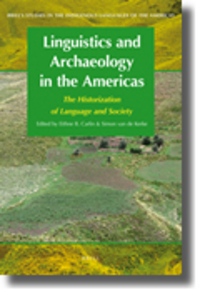Gender, noun class and language obsolescence: the case of Paumarí
Aikhenvald, Alexandra Y. (2010) Gender, noun class and language obsolescence: the case of Paumarí. In: Carlin, Eithne B., and van de Kerke, Simon, (eds.) Linguistics and Archeology in the Americas: the Historization of Language and Society. Brill's Studies in the Indigenous Languages of the Americas, 2 . Brill , Leiden, The Netherlands, pp. 235-252.
![[img]](https://researchonline.jcu.edu.au/15759/5.hassmallThumbnailVersion/15759_Aikhenvald_2010_Book_Cover.jpg)
|
Image (JPEG) (Book Cover)
- Cover Image
Download (52kB) |
|
|
PDF (Published Version)
- Published Version
Restricted to Repository staff only |
Abstract
[Extract] 1. Gender and noun class in one language?
Almost all languages have some grammatical means for the linguistic categorization of noun referents. Grammatical agreement classes - known as genders or noun classes - are, cross-linguistically, the most frequent of these means (see Aikhenvald 2000; 2004). A rarer case is that of one language having two gender- or noun class-like agreement systems operating in the same morphosyntactic environments, and yet differing in their semantics and functions. If a language like this exists, how do we demonstrate the relative independence of the two agreement systems?
The aim of this paper is just that: Paumari, a highly endangered language from the Arawa family spoken in southern Amazonia (Brazil), has two ways of categorizing nouns through marking agreement on a modifier and on a verb. Neither is semantically transparent. One is based on a feminine/masculine opposition, and is termed 'gender'.
The other is based on shape and other intrinsic, structure-related, properties of the noun referent, and is termed ka- noun class (since this is how it is marked on agreeing constituents). The semantics of the two systems, their morphosyntactic contexts and principles of their marking unequivocally show that the two are relatively independent as grammatical systems.
| Item ID: | 15759 |
|---|---|
| Item Type: | Book Chapter (Research - B1) |
| ISBN: | 978-90-04-17362-0 |
| Date Deposited: | 21 Apr 2011 03:09 |
| FoR Codes: | 20 LANGUAGE, COMMUNICATION AND CULTURE > 2004 Linguistics > 200407 Lexicography @ 100% |
| SEO Codes: | 97 EXPANDING KNOWLEDGE > 970120 Expanding Knowledge in Language, Communication and Culture @ 100% |
| Downloads: |
Total: 122 Last 12 Months: 5 |
| More Statistics |



